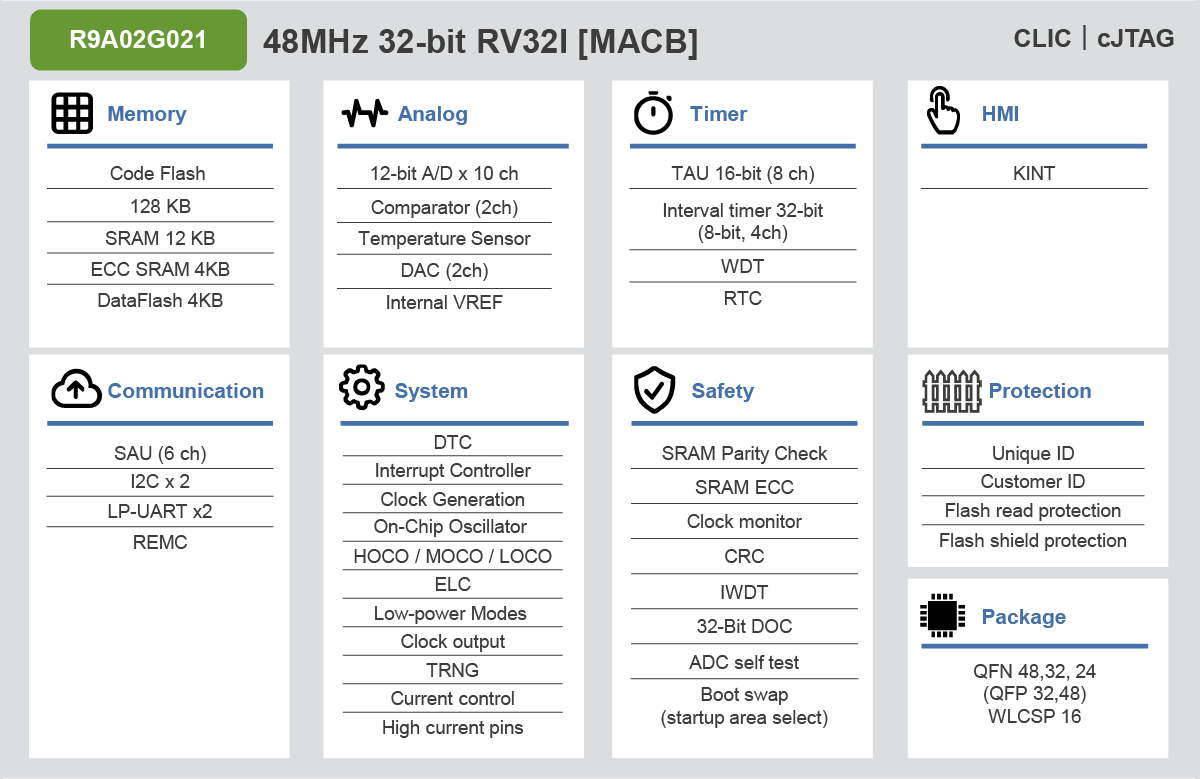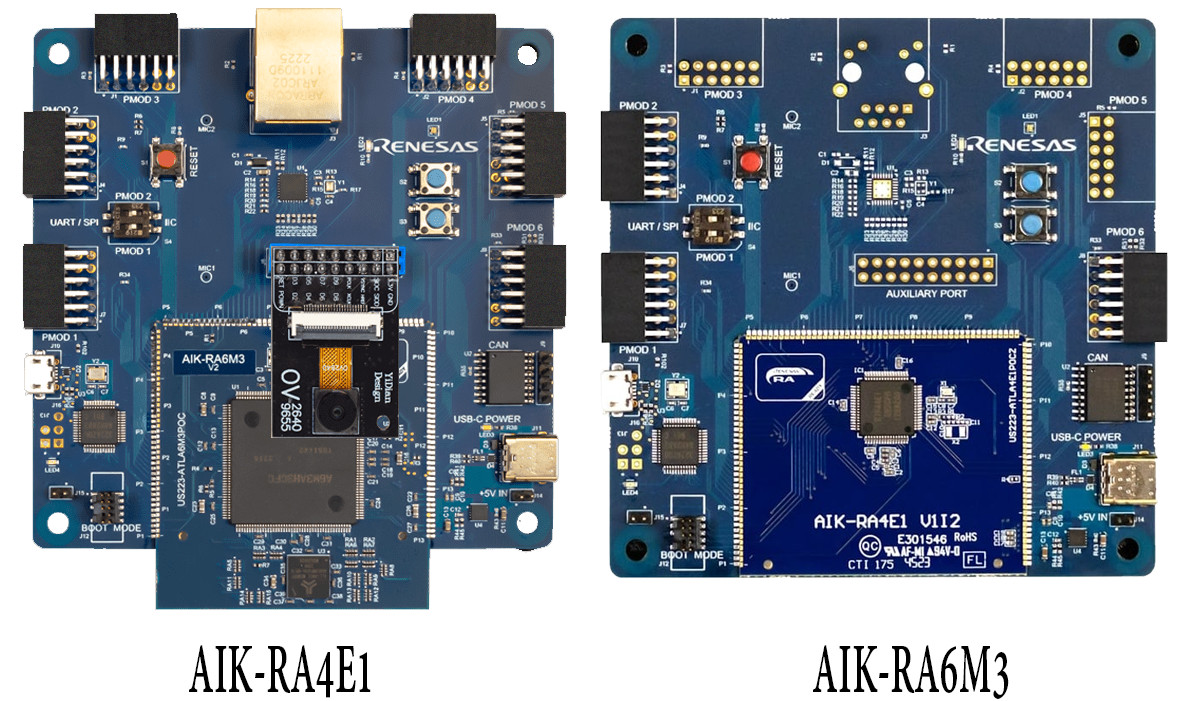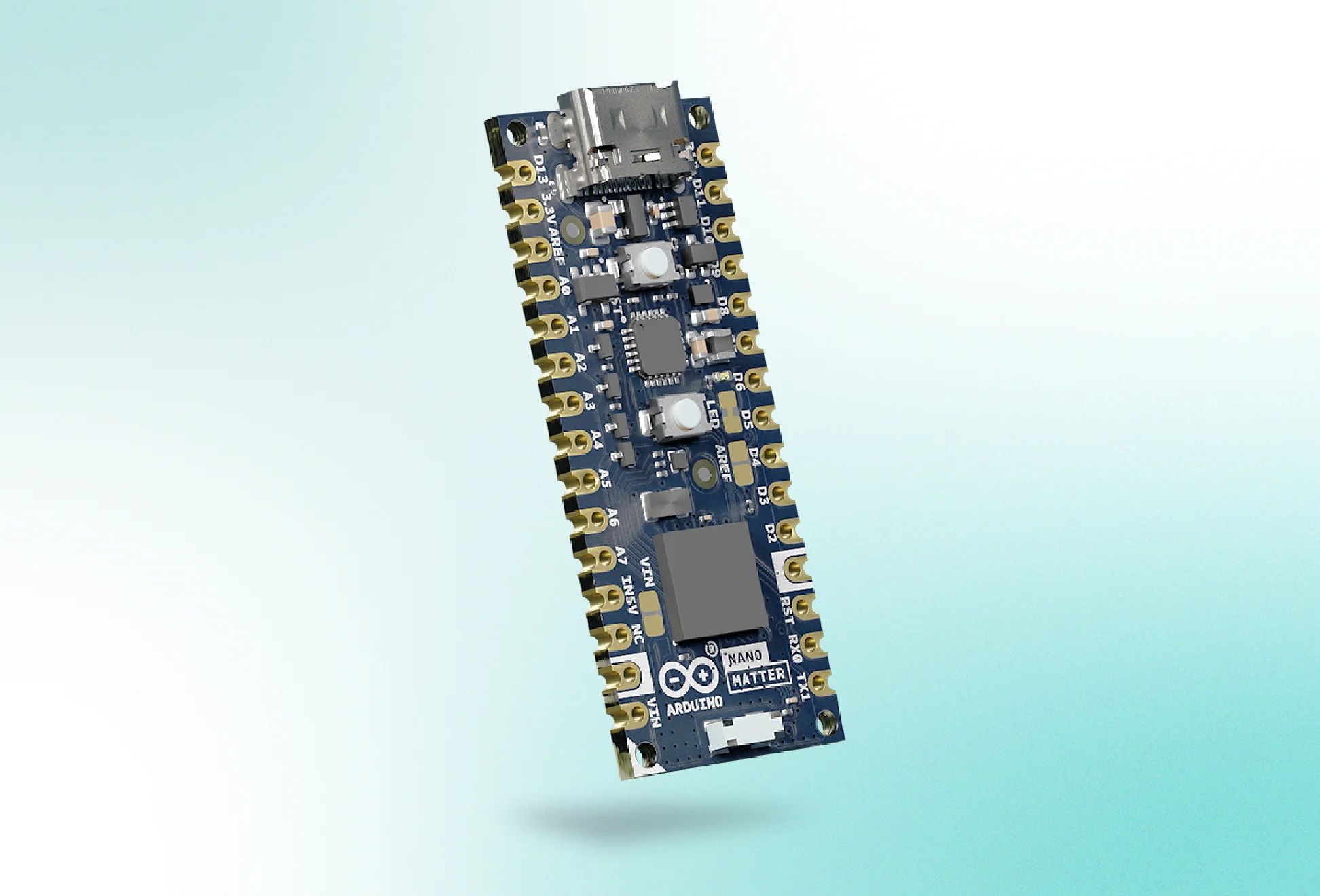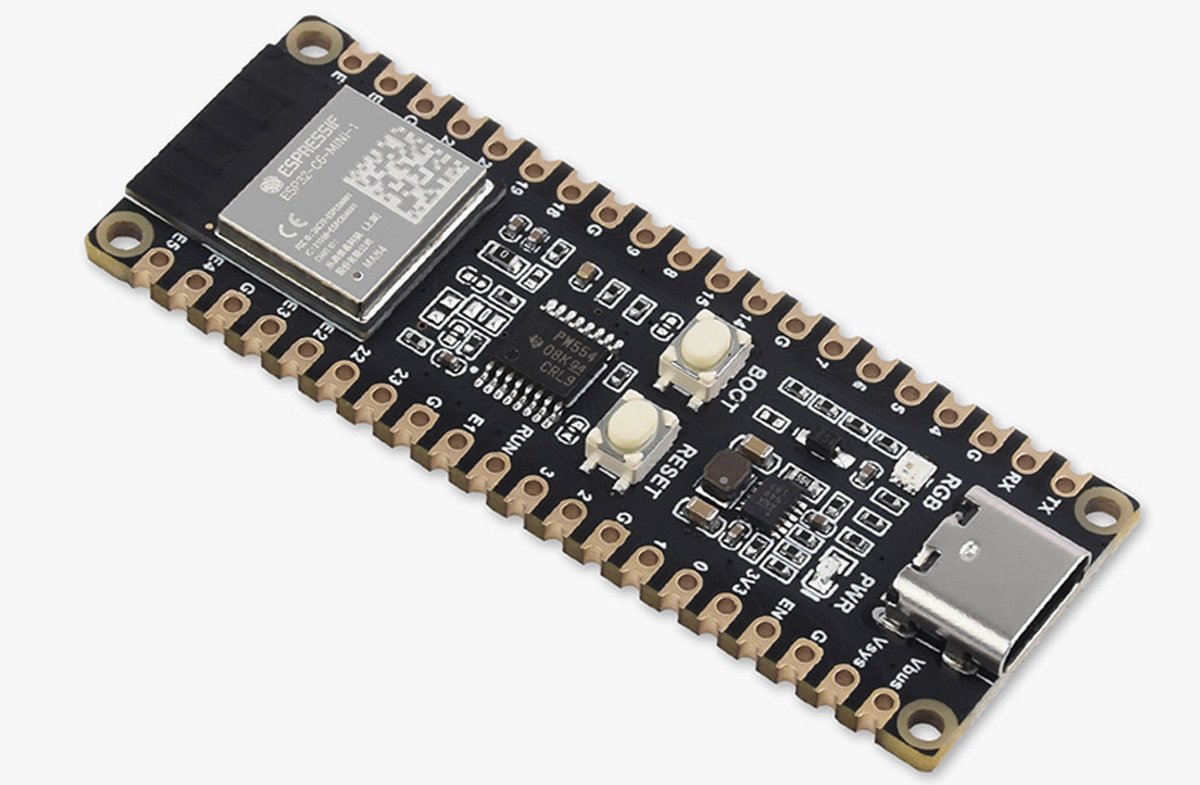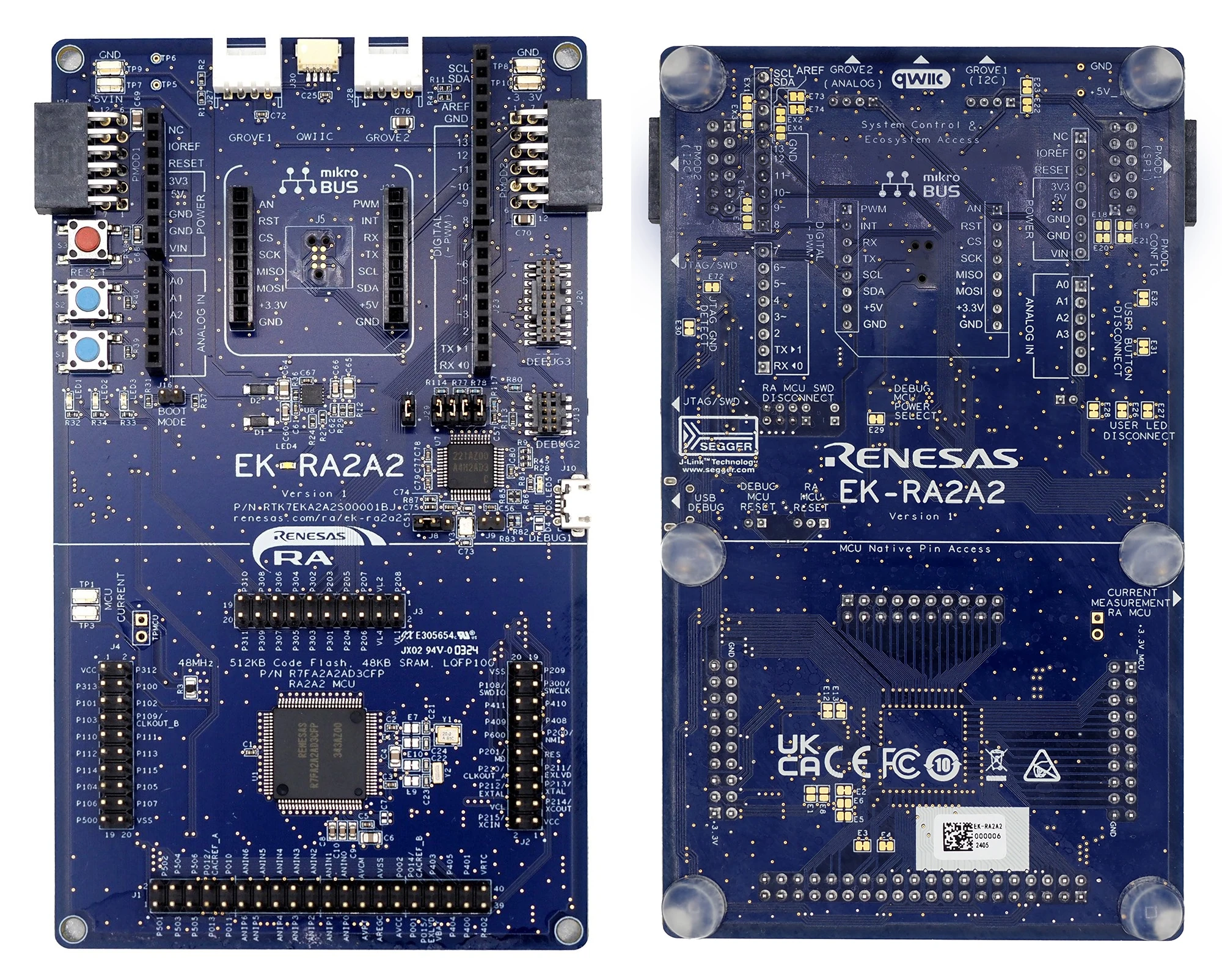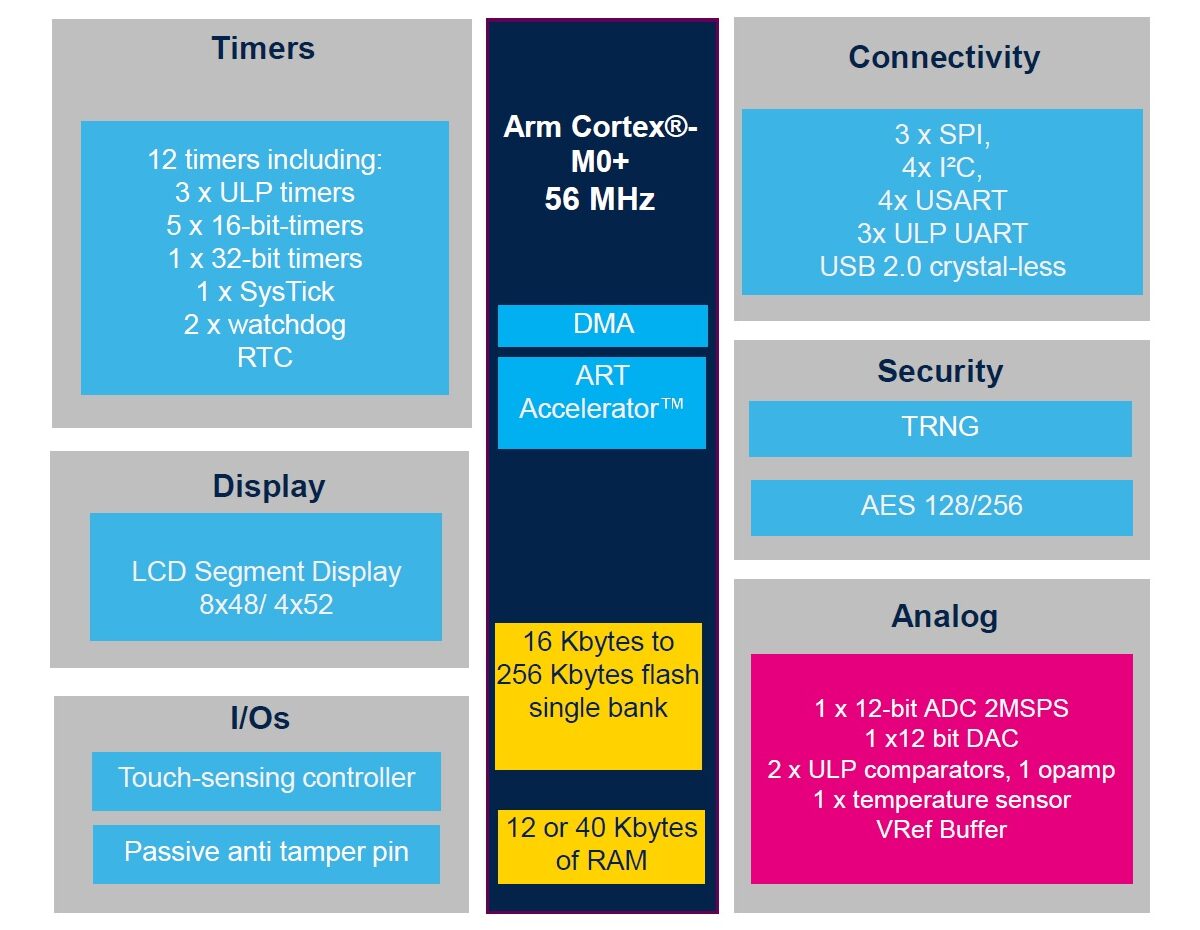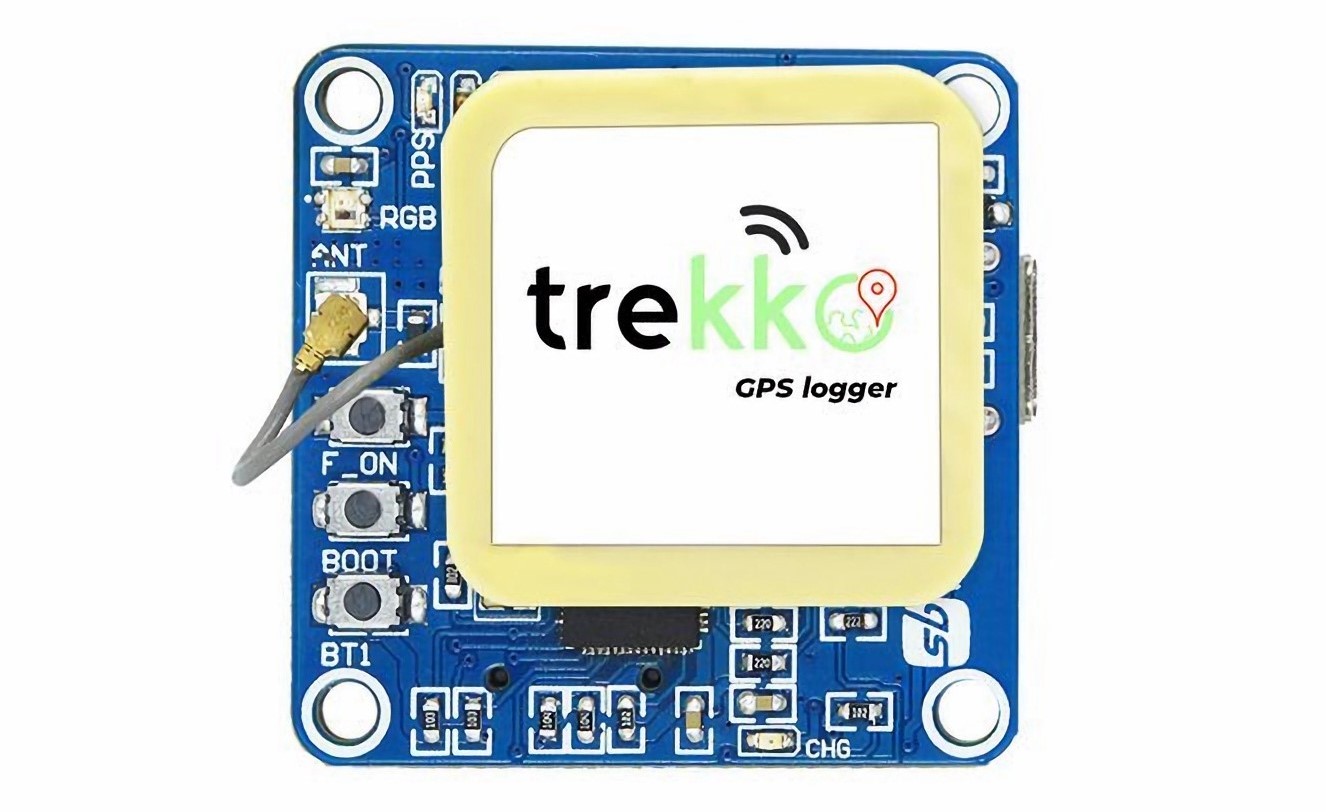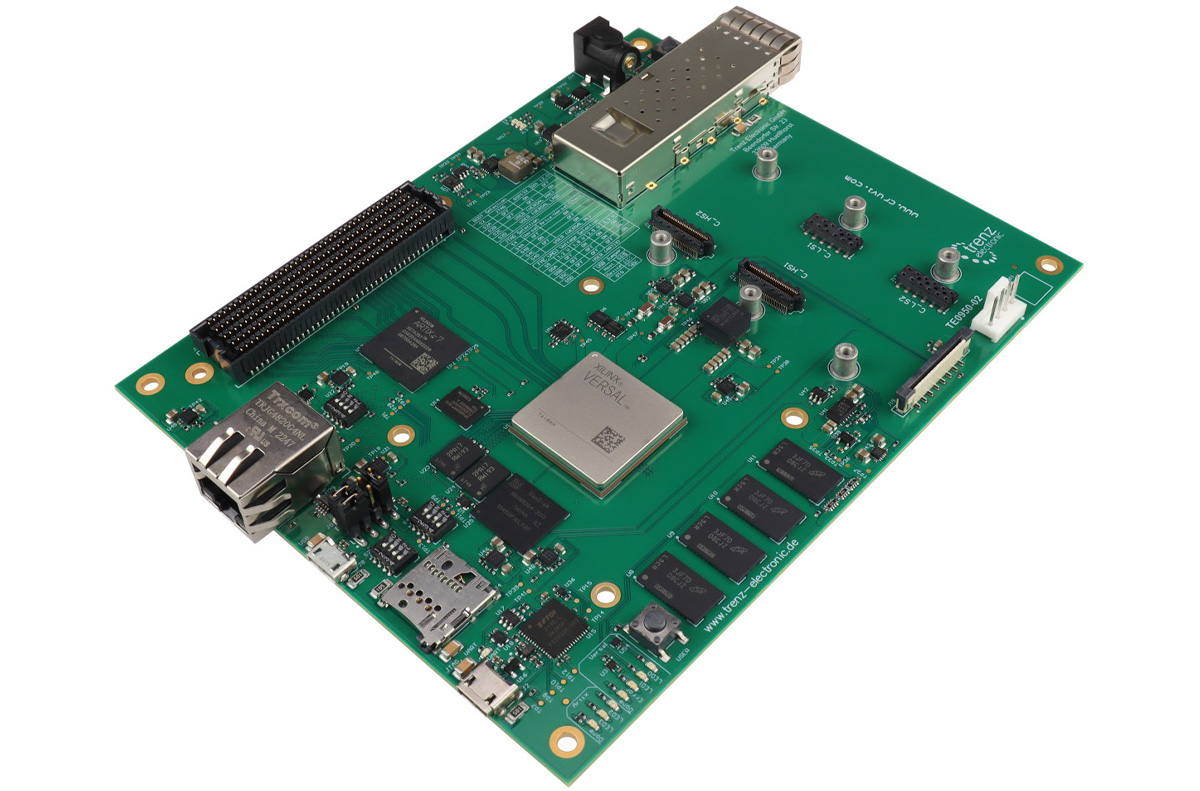Renesas R9A02G021 is the first MCU group to use the company’s in-house designed 32-bit RISC-V CPU core with 3.27 CoreMark/MHz, RV32I base plus M/A/C/B extensions, and features such as a stack monitor register, a dynamic branch prediction unit, and a JTAG debug interface. Renesas has been making RISC-V chips at least since 2022 with the likes of RZ/Five 64-bit microprocessor and R9A06G150 32-bit voice control ASSP. All those were based on Andes RISC-V cores, but since the company has now designed its own 32-bit core, future Renesas 32-bit RISC-V microcontrollers are all likely to feature the in-house core, starting with the R9A02G021 general-purpose MCU group. Renesas R9A02G021 key features and specifications: RISC-V Core Renesas RISC-V instruction-set architecture (RV32I + MACB + Ziscr, Control and Status Register (CSR) instructions + RISC-V Zifencei Instruction-Fetch Fence) Maximum operating frequency – 48 MHz Debug and Trace – RISC-V External Debug Support cJTAG Debug Port […]
Renesas AIK-RA4E1 and AIK-RA6M3 reference kits are designed for accelerated AI/ML development
Renesas AIK-RA4E1 and AIK-RA6M3 are two new development boards based on RA-series 32-bit microcontrollers. These new dev boards have multiple reconfigurable connectivity functions to accelerate AI and ML design and development time. Both boards appear similar, but the AIK-RA4E1 uses the R7FA4E110D2CFM MCU, features three Pmod ports, and has no Ethernet support. On the other hand, the AIK-RA6M3 utilizes the R7FA6M3AH3CFC MCU, has six Pmod ports, and includes Ethernet support. Both the boards support full-speed USB and CAN bus. Renesas AIK-RA4E1 and AIK-RA6M3 reference kits specifications (Consolidated): RA4E1 Microcontroller Features: Model: R7FA4E110D2CFM Package: 64-pin LQFP Core: 100 MHz Arm Cortex-M33 SRAM: 128 KB on-chip Code Flash Memory: 512 MB on-chip Data Flash Memory: 8 KB on-chip RA6M3 Microcontroller Features: Model: R7FA6M3AH3CFC Package: 176-pin LQFP Core: 120 MHz Arm Cortex-M4 with FPU SRAM: 640 KB on-chip Code Flash Memory: 2 MB on-chip Data Flash Memory: 64 KB on-chip Connectivity: One USB […]
Arduino Nano Matter board specifications and price announced
The Arduino Nano Matter is the product of a collaboration between Arduino and Silicon Labs. The Nano Matter board was announced in January and is powered by SiLabs’ MGM240S chip. It offers multiple wireless connectivity options such as Matter, OpenThread, and Bluetooth Low Energy. Support for the Matter standard is the Nano Matter board’s key offering. Matter is an open-source, connectivity protocol that lets smart home devices from different manufacturers interoperate seamlessly. The 45mm x 18mm board leverages dual-mode connectivity, with IEEE 802.15.4 (Thread) for mesh networking and Bluetooth Low Energy for short-range communication. It is targeted at the Internet of Things, home automation, professional automation, environmental monitoring, and climate control applications. Prospective industrial applications include machine-to-machine interoperability, machine status monitoring, and worker status optimization. Arduino Nano Matter specs: MPU – SiLabs MGM240SD22VNA MCU core – 32-bit Arm Cortex-M33 with DSP (digital signal processing) instruction and FPU (floating-point unit) @ […]
$6.99 Waveshare’s ESP32-C6-Pico Board resembles Raspberry Pi Pico board
Waveshare’s ESP32-C6-Pico and ESP32-C6-Pico-M development boards are equipped with the ESP32-C6-MINI-1 module supporting Wi-Fi 6(802.11ax), Bluetooth 5, Zigbee 3.0, and Thread 1.3, and inspired by the Raspberry Pi Pico form factor. They can be powered either through USB Type-C or an external 5V DC supply connected to the pins. Previously we have written about similar ESP32-C6-based boards like the SparkFun Thing Plus, ePulse Feather C6, and WeAct ESP32-C6 dev board. However, these boards are priced way over the $6.99 that Waveshare is offering. One exception is the DFRobot’s FireBeetle 2 ESP32-C6 board, which cuts costs by using the IC directly instead of the fully shielded ESP32-C6-MINI-1 module. Waveshare’s ESP32-C6-Pico board specifications: Wireless module – ESP32-C6-MINI-1 SoC – ESP32-C6H4 32-bit RISC-V microprocessor up to 160 MHz with 320KB ROM, 512KB HP SRAM, 16KB LP SRAM, 4MB flash Wireless – 2.4 GHz WiFi 6 with Target Wake Time (TWT) support, Bluetooth 5.3 LE and […]
Renesas RA2A2 Arm Cortex-M23 microcontroller offers high-resolution 24-bit ADC, up to 512KB dual-bank flash
Renesas Electronics RA2A2 Arm Cortex-M23 microcontroller (MCU) group offers a 7-channel high-resolution 24-bit Sigma-Delta ADC, as well as dual-bank flash and bank swap function for an easier implementation of firmware over-the-air (FOTA) updates. The 48MHz MCU also comes with 48KB SRAM, up to 512KB code flash, various interfaces, and safety and security features that make it suitable for smart energy management, building automation, medical devices, consumer electronics, and other IoT applications that can benefit from high-resolution analog inputs and firmware updates. Renesas RA2A2 specifications: MCU core – Arm Cortex-M23 Armv8-M core clocked at up to 48 MHz Arm Memory Protection Unit (Arm MPU) with 8 regions Memory 48 KB SRAM Memory Protection Units (MPU) Memory Mirror Function (MMF) Storage Up to 512 KB code flash memory in dual bank (256 KB × 2 banks); bank swap support 8 KB data flash memory (100,000 program/erase (P/E) cycles) Peripheral interfaces Segment LCD […]
STMicro announces ultra-low-power STM32U0 MCU, unveils 18nm FD-SOI process for STM32 microcontrollers
STMicro has announced the ultra-low-power STM32U0 Arm Cortex-M0+ microcontroller family running up to 56 MHz that reduces energy consumption by up to 50% compared to previous product generations such as STM32C0 or STM32L0 while targetting SESIP Level 3, PSA-Certified Level 1, and NIST certifications. Separately, the company also introduced a new 18nm FD-SOI manufacturing process for STM32 microcontrollers that will replace the 40nm process currently used. STMicro STM32U0 Cortex-M0+ MCU STMicro STM32U0 key features and specifications: MCU Core – Cortex-M0+ up to 54 MHz with ART accelerator Memory / Storage STM32U031x – 12KB SRAM, 16 to 64KB flash STM32U073x – 40 KB SRAM, 16 to 256 KB flash STM32U083x – 40 KB SRAM, 256 KB flash Display – LCD controller for 8×48 or 4×52 segment displays (STM32U073, STM32U083) Peripherals 3x I2C, 2x SPI, 4x USART, 2x low-power UART. Up to 21x capacitive sensing channels USB – 1x USB 2.0 device […]
SB Components’ Trekko Pico is an open-source, RP2040-powered GPS logger with multi-GNSS support
After the success of their Kickstarter campaign, SB Components has now made the Trekko Pico GPS logger available for pre-order. The Trekko Pico is a small location logger for travelers and outdoor enthusiasts that makes it easy to track routes and record their travels. A Raspberry Pi RP2040 powers the Trekko Pico, providing the programming, connectivity, and data logging functionality. The Quectel GNSS L76K module supports the concurrent reception of GPS, GLONASS (or BeiDou), Galileo, SBAS, and QZSS signals, with 32 tracking and 72 acquisition channels. There is a JST 2-pin connector that can be used to attach an external battery, and the Microchip MCP73831 controller is responsible for battery charging and management. Also, users can slot a coin cell into the holder at the back of the board to power a real-time clock for data backup purposes. Potential applications for the Trekko Pico GPS logger include surveillance, telematics, Geographic […]
Trenz Electronic TE0950-03-EGBE21A – An AMD Versal AI Edge VE2302 SoC FPGA evaluation board
Trenz Electronic recently announced the TE0950-03-EGBE21A an evaluation board with AMD Versal AI Edge XCVE2302-1LSESFVA784 SoC FPGA. This board features 8 GB of DDR4 SDRAM and 128 MB of SPI Flash (as the primary boot option), a microSD card slot, a 32 GB eMMC flash (secondary boot), and an EEPROM with a MAC address. Additionally, the board supports a range of VE-series devices, such as VE2002, VE2102, VE2202, VE2302, and VM1102, enhancing its application versatility. The AMD Versal is a family of adaptive compute acceleration platforms (ACAPs) designed by AMD. Following its acquisition of Xilinx, it integrates CPU, GPU, and FPGA technologies along with dedicated software support to create a highly flexible development environment. Trenz Electronic VE2302 Evaluation Board Specifications: SoC – AMD Versal AI Edge XCVE2302-1LSESFVA784, A784 package, compatible with multiple VE-series devices RAM – 8 GB DDR4 SDRAM Storage 128 MB SPI Flash (primary boot option) MicroSD card […]

